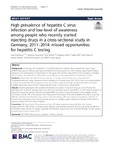High prevalence of hepatitis C virus infection and low level of awareness among people who recently started injecting drugs in a cross-sectional study in Germany, 2011–2014: missed opportunities for hepatitis C testing
Enkelmann, Julia
Gassowski, Martyna
Nielsen, Stine
Wenz, Benjamin
Roß, Stefan
Marcus, Ulrich
Bremer, Viviane
Zimmermann, Ruth
DRUCK Study group
Background
In Germany, risk of hepatitis C virus (HCV) infection is highest among people who inject drugs (PWID). New injectors (NI) are particularly vulnerable for HCV-acquisition, but little is known about health seeking behaviour and opportunities for intervention in this group. We describe characteristics, HCV prevalence, estimated HCV incidence and awareness of HCV-status among NIs and missed opportunities for hepatitis C testing.
Methods
People who had injected drugs in the last 12 months were recruited into a cross-sectional serobehavioural study using respondent-driven sampling in 8 German cities, 2011–2014. Data on sociodemographic characteristics, previous HCV testing and access to care were collected through questionnaire-based interviews. Capillary blood was tested for HCV. People injecting drugs < 5 years were considered NI.
Results
Of 2059 participants with available information on duration of injection drug use, 232 (11% were NI. Estimated HCV incidence among NI was 19.6 infections/100 person years at risk (95% CI 16–24). Thirty-six percent of NI were HCV-positive (thereof 76% with detectable RNA) and 41% of those HCV-positive were unaware of their HCV-status. Overall, 27% of NI reported never having been HCV-tested. Of NI with available information, more than 80% had attended low-threshold drug services in the last 30 days, 24% were released from prison in the last 12 months and medical care was most commonly accessed in hospitals, opioid substitution therapy (OST)-practices, practices without OST and prison hospitals.
Conclusion
We found high HCV-positivity and low HCV-status awareness among NI, often with missed opportunities for HCV-testing. To increase early diagnosis and facilitate treatment, HCV-testing should be offered in all facilities, where NI can be reached, especially low-threshold drug services and addiction therapy, but also prisons, hospitals and practices without OST.
Dateien zu dieser Publikation

